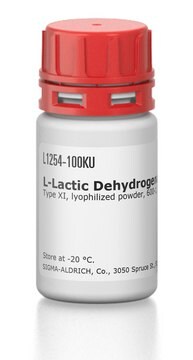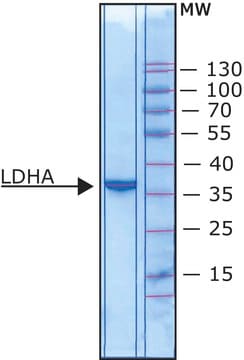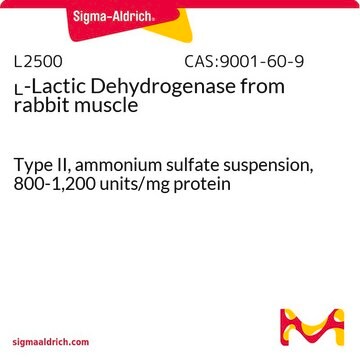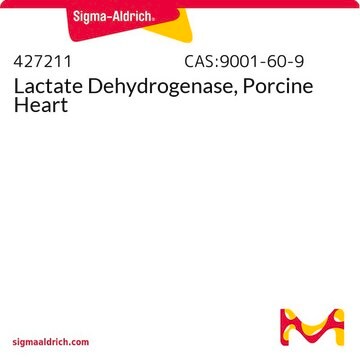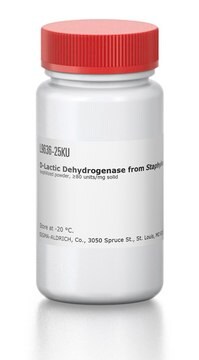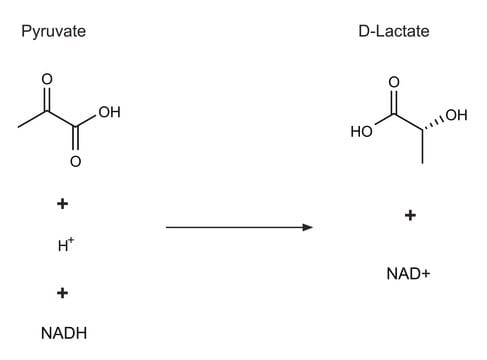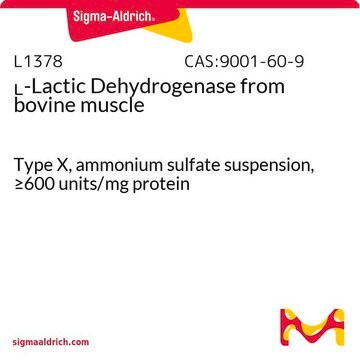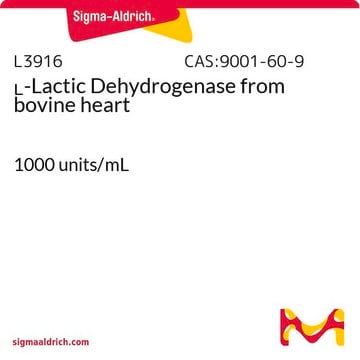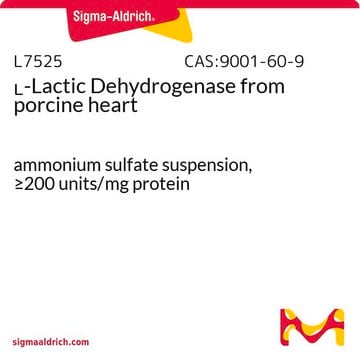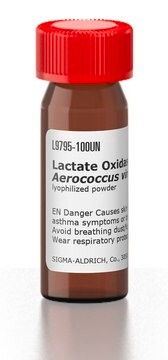59747
Lactic Dehydrogenase, recombinant from E. coli
≥90 U/mg
Synonym(s):
(S)-Lactate: NAD+ oxidoreductase, L-Lactate Dehydrogenase, Lactate
Sign Into View Organizational & Contract Pricing
All Photos(1)
About This Item
Recommended Products
recombinant
expressed in E. coli
Quality Level
form
powder
specific activity
≥90 U/mg
storage temp.
−20°C
Looking for similar products? Visit Product Comparison Guide
General description
LDH (lactic dehydrogenase), a glycolytic enzyme, particularly present in skeletal muscle, heart, liver, kidneys, brain, lungs and red blood cells. It has five isoenzyme forms. LDH possess a tetrameric structure.
Application
Lactic Dehydrogenase, recombinant from E. coli has been used:
- in lactate dehydrogenase (LDH) and malate dehydrogenase 1 (MDH1)assays and cross-linking assays
- to prepare assay buffer to measure pyruvate kinase (PYK) by coupled assay
- in in vitro DltC D-alanylation assay
Biochem/physiol Actions
Conversion of L-lactate into L-pyruvate is crucial in hypoxic and anaerobic conditions, especially when synthesis of adenosine triphosphate (ATP) by oxidative phosphorylation is interrupted.
L-lactic dehydrogenase catalyzes the conversion of L-lactate into L-pyruvate while reducing NAD+ to NADH and H+.
Unit Definition
One unit corresponds to the amount of enzyme which reduces 1 μmol pyruvate per minute at pH 7.4 and 25°C (NADH as cofactor)
Signal Word
Danger
Hazard Statements
Precautionary Statements
Hazard Classifications
Resp. Sens. 1
Storage Class Code
11 - Combustible Solids
WGK
WGK 1
Personal Protective Equipment
dust mask type N95 (US), Eyeshields, Gloves
Choose from one of the most recent versions:
Already Own This Product?
Find documentation for the products that you have recently purchased in the Document Library.
Customers Also Viewed
An atypical glycolysis in Clostridium thermocellum
Zhou J, et al.
Applied and Environmental Microbiology, 39, AEM-04037 (2013)
Cardiac, Vascular, and Skeletal Muscle Systems
Haschek and Rousseaux's Handbook of Toxicologic Pathology (2013)
Circulating biomarkers in malignant melanoma
Advances in Clinical Chemistry, 69, 47-89 (2015)
A partial reconstitution implicates DltD in catalyzing lipoteichoic acid D-alanylation
Wood BM, et al.
The Journal of Biological Chemistry, 293(46), 17985-17996 (2018)
Lifeng Yang et al.
Med (New York, N.Y.), 3(2), 119-136 (2022-04-16)
Ketogenic diet is a potential means of augmenting cancer therapy. Here, we explore ketone body metabolism and its interplay with chemotherapy in pancreatic cancer. Metabolism and therapeutic responses of murine pancreatic cancer were studied using KPC primary tumors and tumor
Our team of scientists has experience in all areas of research including Life Science, Material Science, Chemical Synthesis, Chromatography, Analytical and many others.
Contact Technical Service